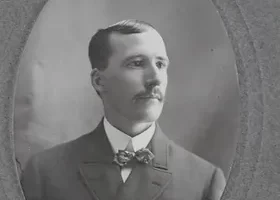In 1898, Hank Miles and his twin brother left Georgia and spent a short time in Utah. In 1900 he came to Wyoming and worked for one day in the coal mines in Hanna. One day was all it took for him to know that kind of life was not for him. He worked at a store in Hanna and also for the P.J. Quealy Ranch in Shirley Basin.
In 1910 Hank married Violet West who lived on a ranch in Shirley Basin. Early in the 1900’s Hank and Violet took up a homestead on Canyon Creek, in Carbon County. This came to be called the 4B, and was the start of the Miles Land and Livestock Company. While living on the 4B Ranch their first son was born.
In 1916 Hank traded the 4B Ranch to the Stephenson family for the Alcova Mercantile, which was next door to the family home in Alcova. It was then that the Miles family moved to Alcova where they lived the rest of their lives. They had two more sons. The Alcova Mercantile began business in the spring of 1910 with three local businessmen. When the store dissolved in 1936 Hank and Violet were sole owners.
Soon after the move to Alcova the Stephenson family turned the 4B Ranch back to the Miles family and they were back in the ranching business.
When Hank first began his homestead he raised only horses. We don’t know how long the horse business lasted but probably it was not too long before sheep were added to the ranch, much to the dismay of some of the neighbors. There were some cattlemen who tried to run Hank out of the country, but it didn’t work! As time passed cattle became the main means of support. Over the years Hank continued to acquire neighboring land and added to the Miles Land & Livestock Company.
During the construction of Alcova Dam and the other dams upstream, the town of Alcova was quite a booming place with a drug store, dance hall, cafes and saloons. Hank hired a man to build a number of tarpaper shacks which where rented to construction workers.
Besides ranching, Hank was active in the community. He served as a deputy sheriff for several years, and on the board of the Natrona County Commissioners in 1928 and 1929. In 1938 he was appointed a member of the board of trustees of the Natrona County Memorial Hospital.
Hank suffered two heart attacks, and also had diabetes. He was unable to recover from the second heart attack, and passed away in July of 1943. At the time of his death he owned and operated large ranching interests in Natrona and Carbon Counties. Hank was always referred to as “a Georgia gentleman”.


